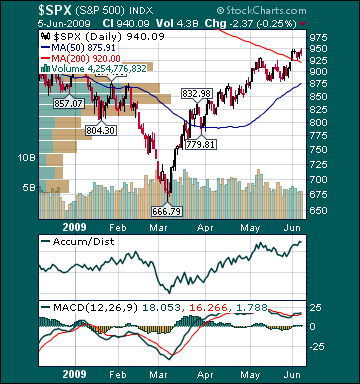Style Underperformer:
Mid-cap Growth (-1.77%)
Sector Underperformers:
HMOs (-3.89%), Steel (-2.85%) and Computer Hardware (-2.35%)
Stocks Falling on Unusual Volume:
CETV, VIP, EQIX, BBL, VRSN, PALM, TNDM, TITN, SSRI, ALNY, GROW, BUCY, BOOM, SPWRA, EQIX, CSIQ, JOYG, AFAM, CASY, TNH, RTI and FSF
Stocks With Unusual Put Option Activity:
1) SLM 2) FMCN 3) MBI 4) UAUA 5) PALM
Portfolio Manager's Commentary on Investing and Trading in the U.S. Financial Markets
Monday, June 08, 2009
Bear Radar
Bear Radar
Style Outperformer:
Large-Cap Value (-.44%)
Sector Outperformers:
Education (+1.35%), Banks (+1.0%) and Road & Rail (+.83%)
Stocks Rising on Unusual Volume:
ESRX, CNSL, ATHN, FUQI, MANT, CEPH, GMCR, AKO/A and PNY
Stocks With Unusual Call Option Activity:
1) STAR 2) ARNA 3) SOL 4) RTI 5) STJ
Links of Interest
Market Performance Summary
Style Performance
Sector Performance
WSJ Data Center
Top 20 Biz Stories
IBD Breaking News
Movers & Shakers
Upgrades/Downgrades
In Play
NYSE Unusual Volume
NASDAQ Unusual Volume
Hot Spots
Option Dragon
NASDAQ 100 Heatmap
Chart Toppers
Real-Time Intraday Quote/Chart
HFR Global Hedge Fund Indices
Sunday, June 07, 2009
Monday Watch
Weekend Headlines
Bloomberg:
Wall Street Journal:
NY Times:
- Russian Reporter Kanev Covers Crime, Defies Threats.
- The Obama administration has made a serious proposal to regulate derivatives — the multitrillion-dollar market in financial contracts that malfunctioned so disastrously last year. The plan goes further than many thought politically possible, especially in its call for federal oversight of all large derivatives dealers. But it does not go far enough. Those dealers — including big banks like JPMorgan Chase, Goldman Sachs and Morgan Stanley — trade derivatives mainly as one-to-one private contracts, largely without any regulation. The plan would allow regulators to impose rules on dealers and track their activities and presumably put a timely halt to abuses. But it does not demand the full transparency that would come from trading all derivatives on exchanges, like stocks.
Business Week:
- A new study says rising Chinese mainland wages and higher shipping costs, among other things, make Mexico a better choice for manufacturing.
Politico:
Rasmussen Reports:
LA Times:
Denverpost.com:
Reuters:
Financial Times:
Telegraph:
Yonhap News:
Nikkei English News:
- Hitachi Ltd., Toshiba Corp. and Fuji Electric Holdings Co. are among a group of Japanese companies expected to build a smart grid in the
Haaretz.com:
Aswat al-Iraq:
-
Al-Hayat
- Saudi King Abdullah urged US President Barack Obama to “impose a solution” to achieve peace in the
Weekend Recommendations
Barron's:
- Made positive comments on (AAPL), (CORE), (CYBS), (VPRT), (EPIQ), (UNG), (HD), (ALL) and (FCX).
- Made negative comments on (AAPL).
Citigroup:
- Reiterated Buy on (ORCL), raised target to $25.
Night Trading
Asian indices are -1.0% to +.50% on avg.
S&P 500 futures -.55%.
NASDAQ 100 futures -.59%.
Morning Preview
US AM Market Call
NASDAQ 100 Pre-Market Indicator/Heat Map
Pre-market Commentary
Pre-market Stock Quote/Chart
Global Commentary
WSJ Intl Markets Performance
Commodity Futures
Top 25 Stories
Top 20 Business Stories
Today in IBD
In Play
Bond Ticker
Economic Preview/Calendar
Earnings Calendar
Who’s Speaking?
Upgrades/Downgrades
Rasmussen Business/Economy Polling
Earnings of Note
Company/Estimate
- (PLL)/.42
- (ZQK)/.06
Upcoming Splits
- None of note
Economic Releases
- None of note
Other Potential Market Movers
- The Fed’s Tarullo speaking, UBS Tech & Service Conference and the Merrill Lynch Samurai Conference could also impact trading today.
BOTTOM LINE: Asian indices are most lower, weighed down by technology and commodity stocks in the region. I expect US stocks to open mixed and to weaken into the afternoon, finishing modestly lower. The Portfolio is 100% net long heading into the week.
Weekly Outlook
Click here for Wall St. Week Ahead by Reuters.
Click here for stocks in focus for Monday by MarketWatch.
There are some economic reports of note and just a few significant corporate earnings reports scheduled for release this week.
Economic reports for the week include:
Mon. – None of note
Tues. – Wholesale Inventories, weekly retail sales reports, IBD/TIPP Economic Optimism Index, US Sells $35B 3-Year Notes
Wed. – Bloomberg Global Confidence, weekly MBA mortgage applications report, weekly EIA energy inventory report, Trade Balance, Monthly Budget Statement, Fed’s Beige Book, US Sells $19B 10-Year Notes
Thur. – Advance Retail Sales, Initial Jobless Claims, Business Inventories, US Sells $11B 30-Year Bonds
Fri. – Import Price Index,
Some of the more noteworthy companies that release quarterly earnings this week are:
Mon. – Quiksilver Inc.(ZQK)
Tues. – Korn/Ferry(KFY), Talbots(TLB), Navistar Intl(NAV), PEP Boys(PBY)
Wed. – Brown-Forman(BF/B), Men’s Wearhouse(MW)
Thur. – National Semi(NSM), Del Monte(DLM)
Fri. – Genentech(DNA)
Other events that have market-moving potential this week include:
Mon. – The Fed’s Tarullo speaking, UBS Tech & Service Conference, Merrill Lynch Samurai Conference
Tue. – UBS Tech & Service Conference, CSFB Convergence Conference, Needham Internet & Digital Media Conference, (IP) Investor Day, William Blair Growth Stock Conference, Piper Jaffray Consumer Conference, Goldman Sachs Healthcare Conference, Merrill Lynch Samurai Conference, RBC Capital Tech/Communications/Media Conference, Morgan Stanley Shipping/Commodities Conference
Wed. – The Fed’s Lacker speaking, Fed’s Duke speaking, William Blair Growth Stock Conference, RBC Capital Tech/Communications/Media Conference, UBS Tech/Service Conference, Needham Biotech & Medtech Conference, BofA/Merrill Transportation Conference, Deutsche Bank Alt Energy Conference, (HD) Investor Conference, Piper Jaffray Consumer Conference, Goldman Sachs Healthcare Conference, CSFB Convergence Conference, (AGU) Investor Day
Thur. – The Fed’s Lockhart speaking, UBS Electronic Payments Summit, BofA/Merrill Transportation Conference, William Blair Growth Stock Conference, Needham Biotech & Medtech Conference, Goldman Sachs Healthcare Conference, UBS Basic Materials Conference, (SYMC) Analyst Meeting, CSFB Convergence Conference
Fri. – The Treasury’s Geithner speaking at G-8 Meeting
